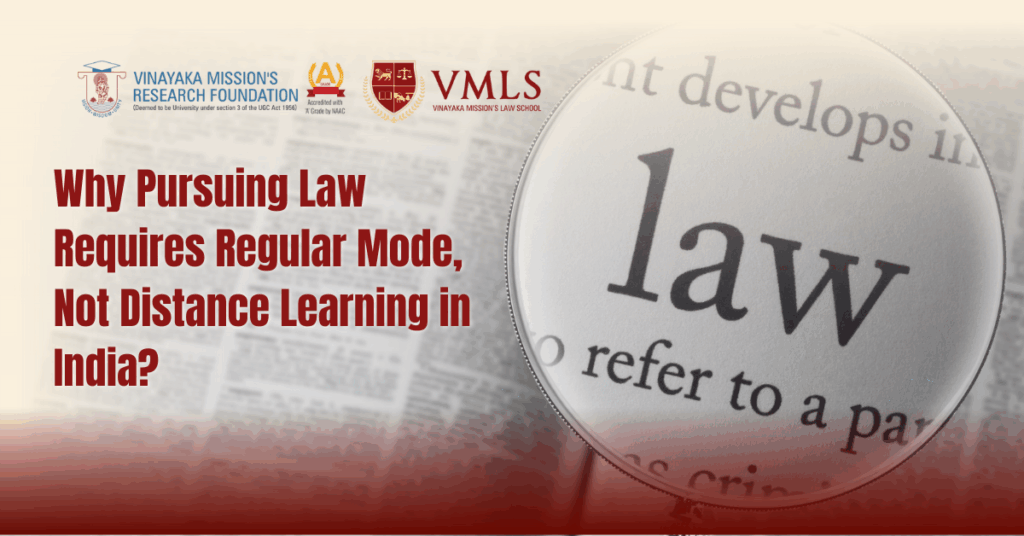Distance LL.B. Degrees : Legal education is not just about acquiring knowledge of statutes, case law, and procedures—it is about training for a profession that directly impacts justice delivery. That is why the Bar Council of India (BCI), the apex regulatory body for the legal profession and legal education in India under the Advocates Act, 1961, has laid down stringent rules: LL.B. degrees obtained through distance or correspondence education are not approved.
This policy has generated recurring debates among aspirants who want flexibility. However, the answer is clear: a distance LL.B. degree is invalid for practicing law in India.
Table of Contents
1. Is Distance LL.B. Valid in India?
The Bar Council of India has categorically stated through its Legal Education Rules and has reaffirmed in Parliament that:
- LL.B. (undergraduate law degree) can only be pursued in regular full-time mode.
- Distance LL.B. is not recognized by BCI.
- Only postgraduate diploma courses in law (like Cyber Law, IPR, Human Rights) can be done through online or distance mode in some universities, but they do not entitle the holder to practice in courts.
Therefore, any university or institution offering a “distance LL.B.” program is not approved by BCI. Graduates of such programs are not eligible to enroll with any State Bar Council and cannot appear for the All India Bar Examination (AIBE).
2. Why Does BCI Not Approve Distance LL.B.?
The rationale comes from both quality concerns and the nature of law as a discipline.
(a) Law Requires Practical Training
Studying law is not limited to theory. A lawyer must:
- Participate in moot courts and debates,
- Gain internship experience with lawyers/judges,
- Work in legal aid clinics,
- Undertake drafting and pleading exercises,
- Be trained in courtroom ethics and advocacy skills.
These cannot be effectively imparted or tested in a distance-learning environment.
(b) Mandatory Classroom Attendance
Under the Rules of Legal Education, 2008 (amended by BCI), every law student must have at least 70% mandatory class attendance. This provision makes distance mode incompatible with the structure of LL.B.
(c) Professional Responsibility of Lawyers
A lawyer interacts directly with clients, courts, and society. BCI insists that aspiring lawyers must undergo full-time professional training to uphold the dignity and seriousness of the profession.
(d) Concerns Over Substandard Law Colleges
Even among regular law schools, BCI has repeatedly warned and shut down institutions with poor infrastructure or faculty shortages. Allowing distance LL.B. would dilute standards even further.
3. Is a Distance Undergraduate Degree Eligible for LL.B.?
Yes. A distance undergraduate degree (like B.A., B.Com, or B.Sc.) approved by UGC is valid and makes the candidate eligible to apply for a 3-year LL.B. program, provided the degree is from a recognized university.
Example: If you complete B.A. through IGNOU (distance mode), you can still apply for a regular LL.B. (3-year) course at a BCI-approved law school.
👉 What is invalid is the LL.B. itself in distance mode, not the qualifying degree.
What to Know Before Doing a Distance Degree for Law School Eligibility?
1. Eligibility Confusion
- While UGC recognizes many distance degrees, not all law colleges automatically accept them.
- Some highly reputed universities or private law schools may prefer or demand regular graduation degrees.
- Even though legally you’re eligible, you might face additional scrutiny or verification at the time of admission.
2. Reduced Academic Rigor
- Distance learning often lacks the classroom interaction, debates, and peer-learning experience that law schools value.
- This might impact your preparedness for the academic intensity of LL.B., which involves moots, drafting, case laws, and regular attendance.
3. Limited Weight in Competitive Exams
- For judiciary exams, UPSC Law papers, or corporate placements, a distance bachelor’s degree is valid, but it may not always carry the same weight as a regular degree in the eyes of some recruiters or selectors (perception bias).
4. Career Progression Abroad
- If you plan to pursue LL.M. abroad (UK, US, Canada) after LL.B., some international universities may not recognize a distance undergraduate degree as qualifying for admission. They usually prefer a regular, on-campus bachelor’s as evidence of academic rigour.
5. Networking and Soft Skills Gap
- Law is heavily about networking, internships, and communication skills. If your undergraduate was in distance mode, you would have missed out on:
- Student clubs, debates, workshops, internships during undergrad.
- These experiences can be a big advantage when applying to law school.
6. Risk of Fake or Unrecognized Universities
- Many private institutions advertise “fast-track” distance degrees. If your UG is from an unapproved or blacklisted university, your LL.B. admission could later be questioned or canceled. Always check UGC-DEB approval before enrolling.
Bottom Line
- A distance bachelor’s degree is legally valid for LL.B. admissions in India, provided it is from a UGC-DEB recognized university.
- However, the side effects are mostly perception-related, reduced exposure, and limited global opportunities.
- If you’re serious about a strong legal career (especially academic, judiciary, or international law), a regular bachelor’s degree gives a stronger foundation than a distance one.
4. Are There Bar Council-Approved Distance LL.B. Courses in Tamil Nadu or Elsewhere?
No. Whether in Tamil Nadu, Delhi, Maharashtra, or any other state, the stand is the same: BCI has not approved LL.B. in distance or correspondence format anywhere in India.
The Tamil Nadu Dr. Ambedkar Law University, for example, offers only regular LL.B. programs with Bar Council recognition. But some private or unrecognized institutions mislead students with “distance LL.B.” advertisements—these are invalid.
5. What About LL.M. through Distance Education?
The discussion is more flexible at the postgraduate level:
- BCI regulates LL.M. as well but has not strictly barred distance learning yet.
- Some universities (like IGNOU) have experimented with LL.M. through distance mode, though the BCI’s approval status keeps evolving.
- However, LL.M. in distance mode does not qualify someone to practice law; it is only an academic/academic-research qualification.
6. Initiatives Taken by BCI to Improve Legal Education
From the Rajya Sabha official response (2020) and latest BCI circulars, the following steps have been taken to strengthen legal education:
- Curriculum updates in consultation with universities.
- Mandatory attendance and live classroom teaching.
- Surprise inspections of law colleges.
- Biometric attendance for faculty and students.
- Closure of colleges lacking basic infrastructure.
- Faculty recruitment rules and enforcement.
- Focus on experiential learning through moot courts and internships.
These ensure law students are well-prepared for 21st-century legal challenges, especially in areas like Artificial Intelligence, Intellectual Property, and Technology Law—fields where futuristic institutions like Vinayaka Mission’s Law School, mentored by Jindal Global Law School, are playing a pioneering role.
7. The Final Word for Aspiring Law Students
- A distance LL.B. degree is not valid in India.
- Enrollment in such a course will waste valuable time and money since graduates cannot register as advocates with any State Bar Council.
- Candidates must choose only Bar Council of India-approved law schools offering regular LL.B. degrees.
- Distance or online modes are fine for short-term diplomas or certifications, or a recognized undergraduate degree used as a stepping stone before LL.B.
Key takeaway:
- To practice law in India, you must pursue a full-time, regular LL.B. from a BCI-approved institution.
- Distance LL.B. is not and will not be recognized by the Bar Council of India.



